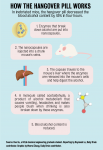UCLA researchers are developing a pill to relieve hangovers.
Yunfeng Lu, a chemical and biomolecular engineering professor at UCLA, and Cheng Ji, an associate professor at the University of Southern California, created a pill that decreased blood alcohol by 45 percent in inebriated mice within four hours.
The pill is an FDA-approved nanocapsule filled with enzymes that are naturally found in liver cells. The enzymes degrade alcohol so that individuals are no longer hungover.
Duo Xu, a chemical and biomolecular engineering graduate student who worked on the project, said although the pill can be used to relieve hangovers, he hopes the pill will also be used in emergency rooms to prevent organ damage and loss of consciousness from alcohol poisoning.
“Alcohol is a big problem for society as well as individuals,” Xu said. “Many people are hungover, intoxicated, and go to the ER.”
Xu added 10 percent of emergency department visits are due to acute alcohol intoxication and even more result from long-term alcohol intoxication.
Xu said in order for the pill to be safe, it must not only decompose alcohol, but also the molecule acetaldehyde, a toxic byproduct of alcohol decomposition that can cause cancer by damaging DNA. The pill has broken down acetaldehyde in mice, but it has not been tested in other animals.
Xu added his team plans to apply for grants and funding to test the pill on larger animals, and eventually humans. They have submitted patents for the nanocapsule through UCLA.
Helen Meng, a third-year molecular, cellular, and developmental biology student, said she thinks the pill would be useful for college students who drink to have fun, especially those who have lower alcohol tolerance and are more prone to hangovers.
Matthew Espinoza, a first-year music education and performance student, said he thinks the pill could be dangerous because students could become reliant on it and drink more frequently.
Xu said he had difficulty figuring out how to find the optimal combination of enzymes and lower acetaldehyde levels, but is glad to have created an effective pill and hopes for further success in human trials.
“Whenever you work on a project there are always challenges to be overcome. We hope to treat this big problem in our society,” he said.

Hello, do you know where I can get more information on this p
ll?